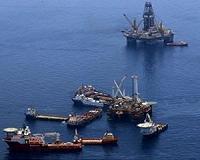 |
Point A La Hache, Louisiana (AFP) April 20, 2011 One by one, the fishermen walked up to a microphone set up in Louisiana's coastal wetlands to vent their frustration and fears a year after the BP Deepwater Horizon disaster unleashed the biggest maritime oil spill in history. Fisherman Mike Roberts spoke of flying all the way to London to tell BP shareholders that "all is not well in Louisiana" and being denied access to the oil giant's annual meeting. There is still oil in the marshes, some of the best fishing grounds are still closed, and BP isn't fulfilling its promise to make those affected by the spill "whole," he told reporters gathered on a small dock in Point a la Hache. "The claims process is a farce," Roberts said. "They're throwing out little bits of money here and there and it is not helping who it should be." Shrimper Acy Cooper said he's afraid that people won't want to buy Gulf seafood, even though all the tests show that it's safe. "Consumer confidence is at an all-time low. How do we get it back?" he asked. Officials predict a bumper crop this year after overfished stocks were granted a reprieve from the nets when a third of US waters were closed in the wake of the spill. Fishermen welcome the news, but don't take much comfort in it. That's because Alaska's fishing was fine the year after the 1989 Valdez spill. Three years later, the herring fisheries collapsed from disease. And they still haven't come back. Fishermen are worried the same thing might happen here, especially since nearly two million gallons of chemical dispersants were used to help keep the oil from reach fragile coastal wetlands and pristine beaches. "We have businesses that are about to fail, we have fishermen that are about to fail, we do not know what this year will bring," said Clint Guidry, president of the Louisiana Shrimp Association. Oil-coated dolphin carcasses and sticky tar balls continue to wash up on beaches a year after the April 20, 2010 explosion which killed 11 workers and sank the Deepwater Horizon some 50 miles (80 kilometers) off the coast of Louisiana. By the time the well was capped 87 days later, 4.9 million barrels (206 million gallons) of oil had gushed out of the runaway well 5,000 feet below the surface of the Gulf of Mexico. Hundreds of miles of fragile coastal wetlands and beaches were contaminated, a third of the Gulf's rich US waters were closed to fishing, and the economic costs have reached into the tens of billions. "Clean up efforts in some places are still ongoing, and the full scale of the damage done to our state has yet to be calculated, but the good news is that most all of our fishing waters are back open again," said Louisiana Governor Bobby Jindal. Jindal said his state is making another "historic comeback" and urged tourists to return to the Gulf to sample its delicious seafood, great festivals and fantastic music. "Come down here to go fishing, visit our coastal communities," he said at a press conference in the hard-hit beach town of Grand Isle. "This is the home of where we 'let the good times roll' -- and at the heart of that fun is our incredible people." Activists at a sunrise vigil in New Orleans said the disaster should be a catalyst for moving the country towards greater use of alternative energy sources. "The only way to protect our communities, our waters and our air from another disaster is to break our addiction to oil and embrace a cleaner, safer energy future for America," said Sierra Club president Robin Mann. "We must not allow the lives lost in the BP disaster to be in vain," she said after a prayer service. "Recovery on the Gulf, the health of our economy, and the safety of all Americans depends on action now."
Share This Article With Planet Earth
Related Links Powering The World in the 21st Century at Energy-Daily.com
 Drilling picks up one year after BP oil spill
Drilling picks up one year after BP oil spillPort Fourchon, Louisiana (AFP) April 20, 2011 Drilling is picking up in the Gulf of Mexico a year after the BP Deepwater Horizon oil disaster - a relief for those dependent on the offshore industry but a worry for environmentalists. It took 87 days for the British energy giant to cap its runaway well after the April 20, 2010 blowout, which killed 11 workers and caused the biggest maritime oil spill in history. President Barack Obam ... read more |
|
| The content herein, unless otherwise known to be public domain, are Copyright 1995-2010 - SpaceDaily. AFP and UPI Wire Stories are copyright Agence France-Presse and United Press International. ESA Portal Reports are copyright European Space Agency. All NASA sourced material is public domain. Additional copyrights may apply in whole or part to other bona fide parties. Advertising does not imply endorsement,agreement or approval of any opinions, statements or information provided by SpaceDaily on any Web page published or hosted by SpaceDaily. Privacy Statement |